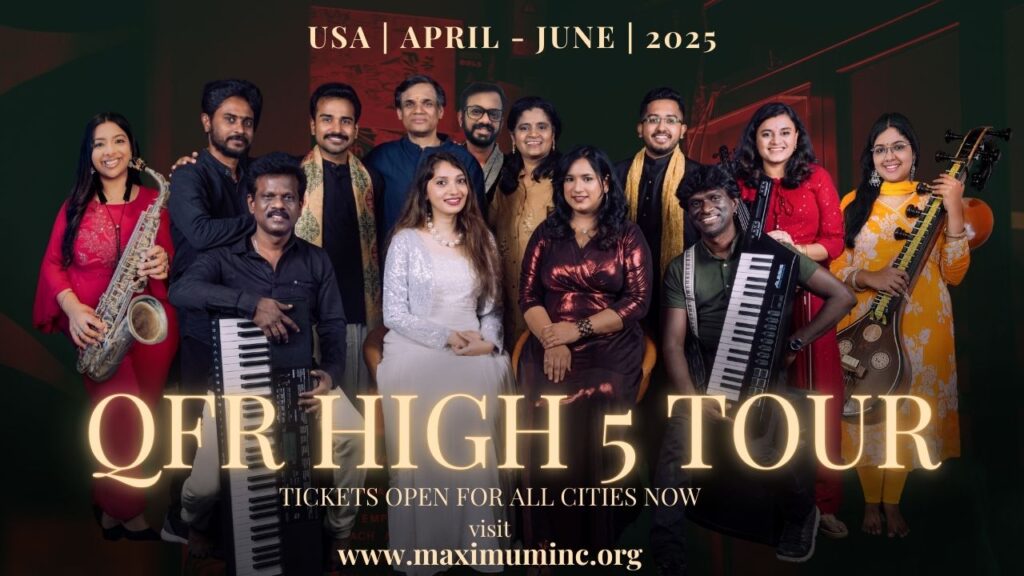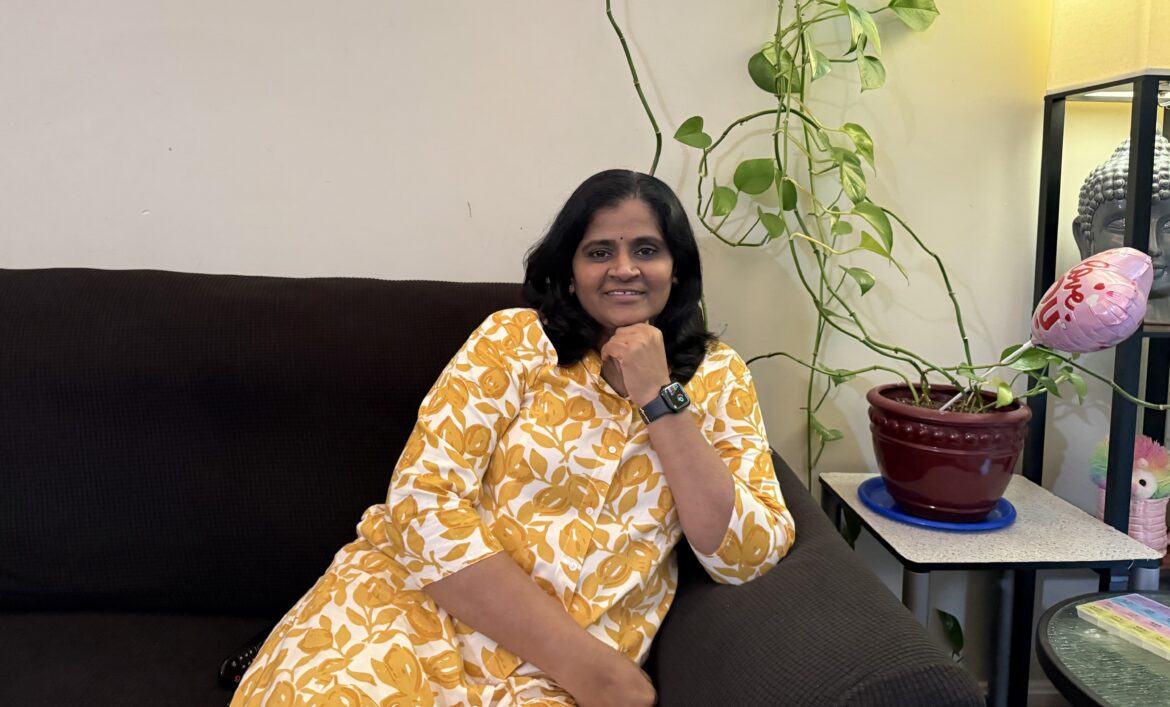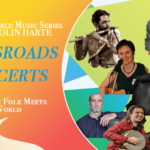After captivating global audiences online during the pandemic, Quarantine from Reality (QFR) is now touring live, bringing its unique blend of nostalgia and innovation to the stage. In this exclusive interview with South Asian Herald on May 22, 2025, in Herndon, Virginia, Subhasree Thanikachalam, QFR’s musical mastermind shares insights into the concert’s DMV debut, the evolution of the project, and how a lockdown idea became a global movement – and a source of hope for countless fans and musicians.
You’re set to perform the Quarantine from Reality (QFR) concert in the DMV area on May 24, 2025. How are you feeling ahead of the concert? What can your fans look forward to with regard to special compositions or surprises?
I’m very excited to finally bring QFR to the DMV area. I felt genuinely bad when we missed performing here during our first QFR Live tour in 2023. We covered 11 cities back then but somehow skipped the DMV and New Jersey, two places where we have strong fanbases. Many fans reached out, asking how we could miss them. So, I’m grateful we’re able to make it this time, thanks to the support of organizers like Babu Vinayagam from the World Tamil Music Development Center and others. Every QFR concert is designed to feel like a surprise. I curate specific elements for each city, because with such a connected world, it’s important to keep the experience fresh and engaging. We aim to break the monotony and offer something uniquely memorable every time.
The QFR High 5 Tour has already taken you to cities like San Francisco, Seattle, Detroit, Chicago, Tampa, New Jersey, and Boston. What have been some standout moments or memorable experiences from those performances?
We named it the QFR High 5 Tour to celebrate five years of QFR, and to metaphorically give a ‘high five’ to our audience around the world. One of the most memorable moments was our first performance in San Jose, which was completely sold out. The reception from both the audience and organizers was heartwarming. What touches me most is how people treat us – not just as musicians, but like family. They relate to us on a deeply personal level, and that warmth has been consistent across all the cities. One particularly touching aspect has been seeing children sing along to classics from the 1950s and 60s. It shows that music truly transcends generations.

With upcoming performances in Georgia, Dallas, and Los Angeles, what can audiences in these cities look forward to? How will these performances differ from the earlier ones on the tour?
For cities where we’ve already performed in 2023, like San Jose, Detroit, Chicago, and Atlanta, we’re curating entirely new experiences. We don’t want to repeat what we did last time. We see this as a creative opportunity to introduce fresh ideas and reinvent the experience. We’ve also incorporated a lot of interactive experience. Using screens and technology, we demonstrate how we produce QFR, from different locations around the world. Many people still wonder how is that one person is singing in one location and other person is playing from another location? Giving them a peek behind the curtain really excites the crowd.
QFR was born at a time when the world was under lockdown – back on March 23, 2020. What inspired you to create this unique musical concept during such an uncertain period?
QFR started as a personal idea that unexpectedly turned into a movement. When the lockdown was announced, I was deeply disheartened. As performers, being told to stay indoors felt devastating. Our income vanished, and like many artists, I found myself in a financial and emotional slump. Having been in the music industry since 1996, I decided to put my experience to good use. I thought, “Why not share what I’ve learned?” And the moment QFR went live, I realized that the world had been waiting for something like this. It resonated immediately.
What began as a 21-day music marathon has now grown into a global movement. Could you walk us through how QFR has evolved over the years?
I began the journey with two trusted musicians, Venkat and Shyam, who I have known for several years. Over time, we started creating music and evolved into a tightly knit musical family. We performed our first 100 songs entirely for free. After that, we introduced a crowdfunding model instead of seeking sponsors. Today, we have a global QFR family of around 600 members, all contributing in various ways. The community spirit is what keeps us going.
During a time when many artists were struggling with isolation and uncertainty, QFR served as a beacon of hope. Could you share some of the conversations you had with those musicians at the outset of this journey?
The best compliments came from the musicians. Instead of just talking about music legends like Ilayaraja, MSV, KVM, I made it a point to highlight the instrumentalists, the accordion players, the guitarists, the drummers, who often went unrecognized. Hearing these reviews, families and fans of the musicians are so thrilled. For many of these musicians, it was the first time their contributions had been publicly acknowledged. Today, every musician loves that level of appreciation from QFR.
Have musical legends such as Illayaraja, and A. R. Rahman shared any feedback or reflections on Quarantine from Reality? If so, what did their responses mean to you?
I haven’t heard from them directly, but I’ve been told that Raja Sir listens to QFR regularly and has spoken positively about it. The late SPB Sir, however, was the first to recognize our work. From our third episode onward, he encouraged me with consistent feedback. He told me, “Don’t stop this,” and whatever I am doing will be remembered for a long time. That’s a blessing I hold very close to my heart.
Sustaining a creative initiative over time comes with its own set of challenges. What have been some of the key obstacles in keeping this project alive and thriving?
I wouldn’t call them obstacles, but everyday challenges. The most persistent issue is funding. Every week, I wonder how I’ll pay the musicians. Thankfully, something always comes through. Post-lockdown, we started performing live in Chennai and other parts in India. I created a model where, after paying the musicians, a part of the revenue from live shows supports the online QFR content. We also commit to producing two new songs each week, which requires global coordination and strict quality control to meet our standards. So, every week is a challenge. Every week until the song is up at 9pm IST on YouTube, it’s a challenge.
In your view, what is it about this concept that has struck such a deep chord with audiences around the world?
One word: nostalgia. Over time, mainstream platforms like radio and TV stopped playing older songs. These platforms are only playing whatever is a super hit now. That’s where QFR stepped in. We brought back the melodies people grew up with – songs from their school and college days. In a way, we tapped into something personal and emotional, and that connection is the true reason for QFR’s success.
Looking back, what are some of the most profound lessons you have taken away from both the COVID-19 experience and your work on QFR?
The biggest lesson is that nothing ends until you want to stop. When the world shut down, QFR opened doors. God has taught me that no door is ever truly closed – there’s always a ray of hope. And for me, that hope came through music.
(This interview has been edited for length, brevity and clarity)






